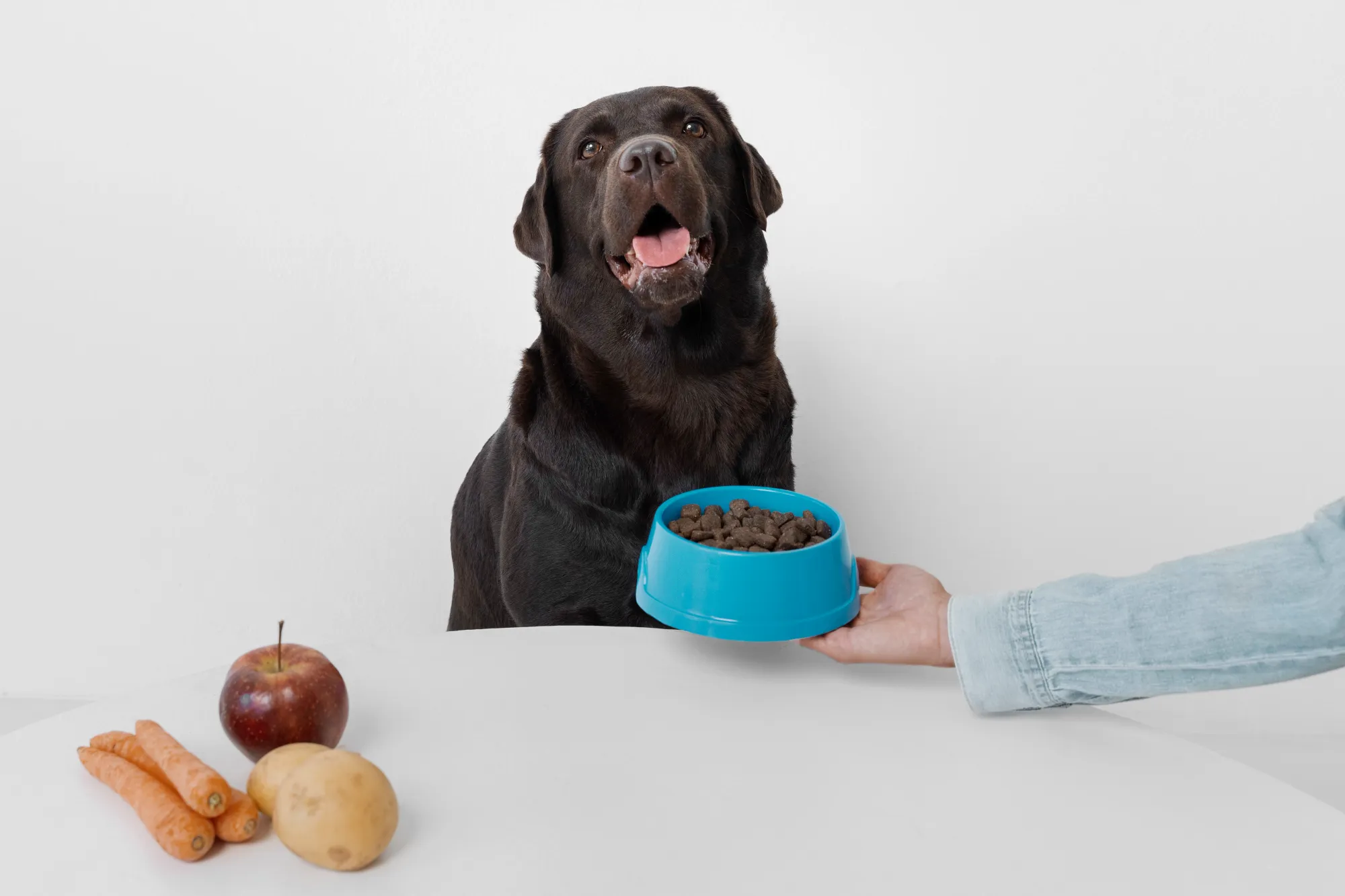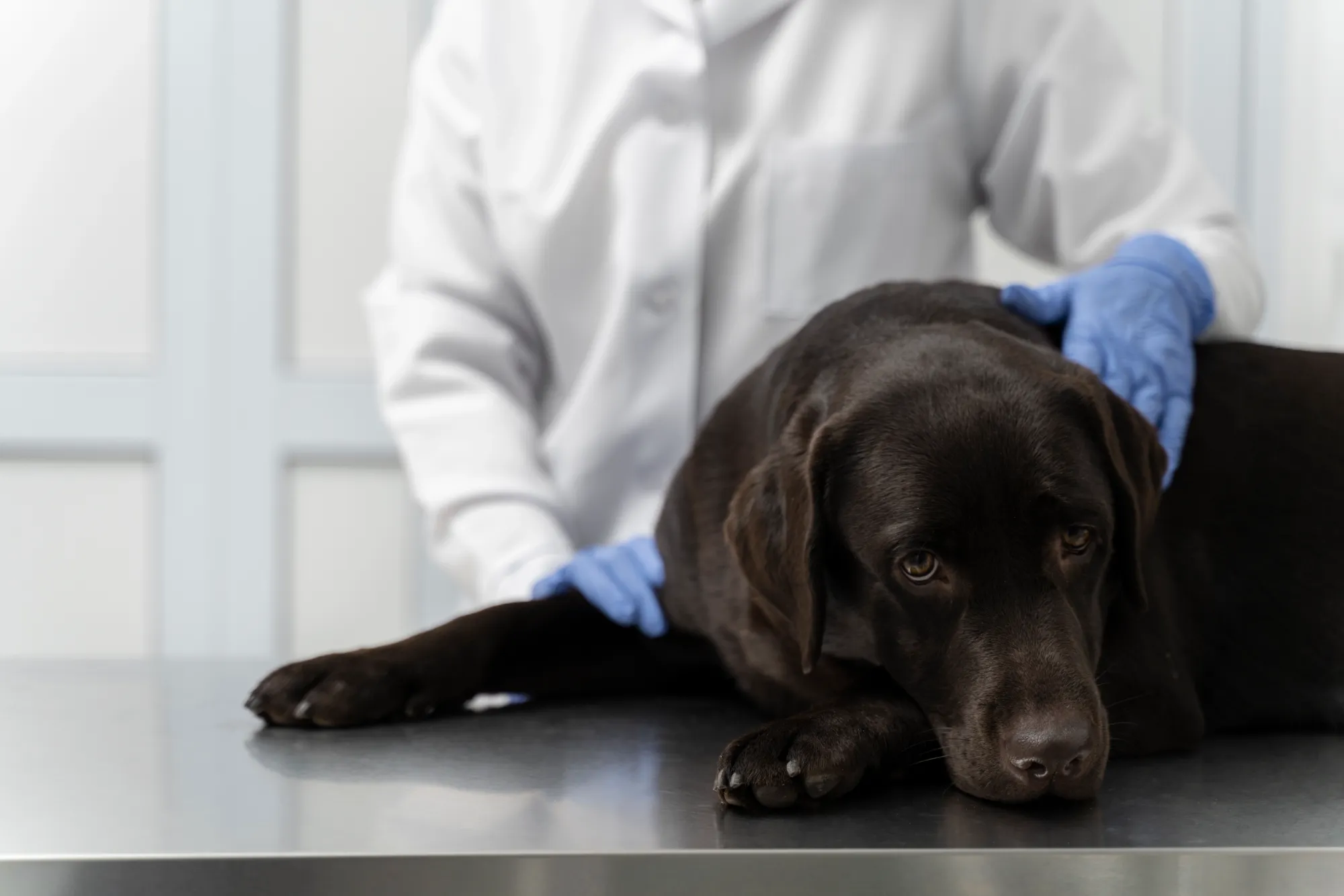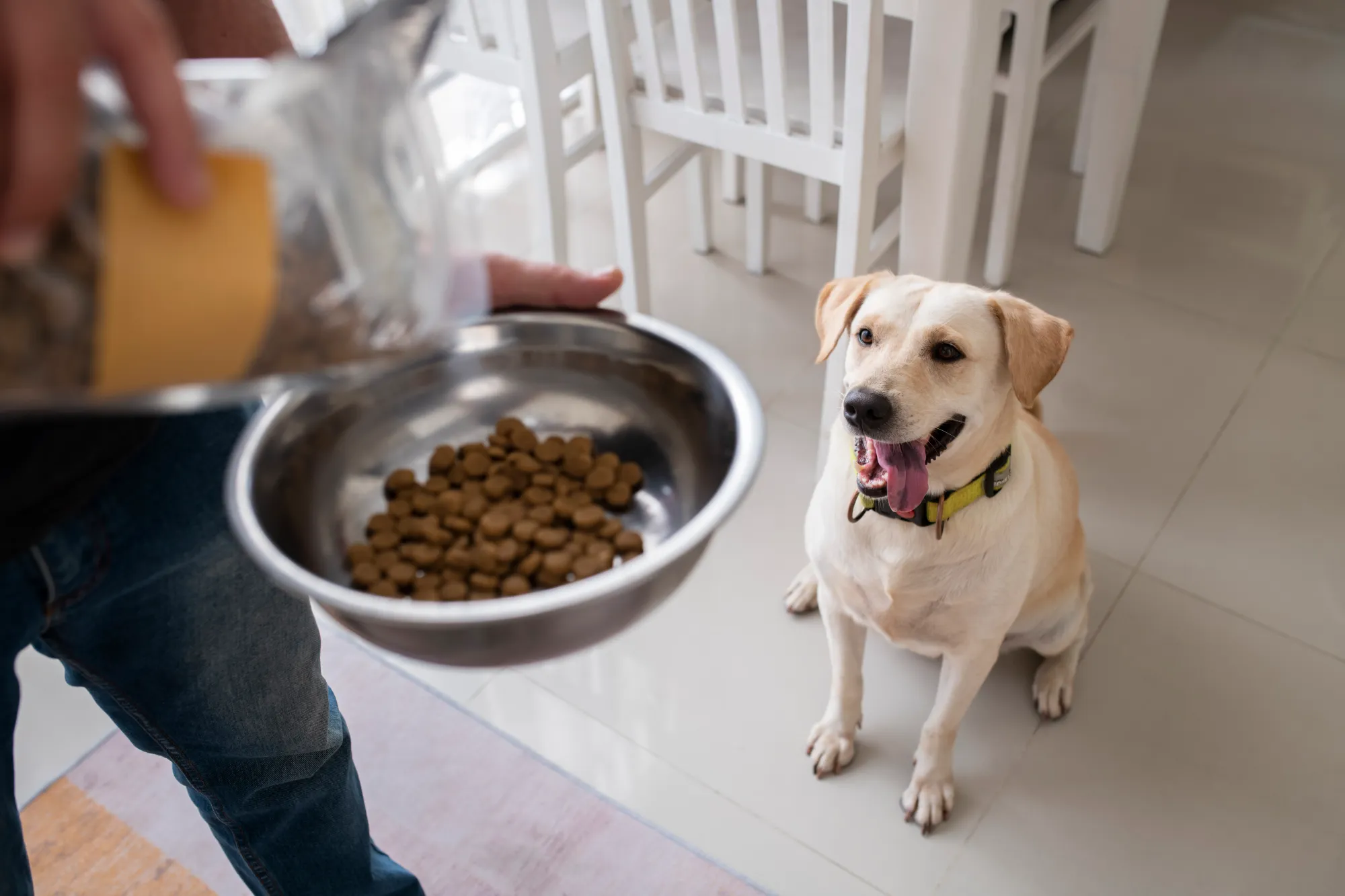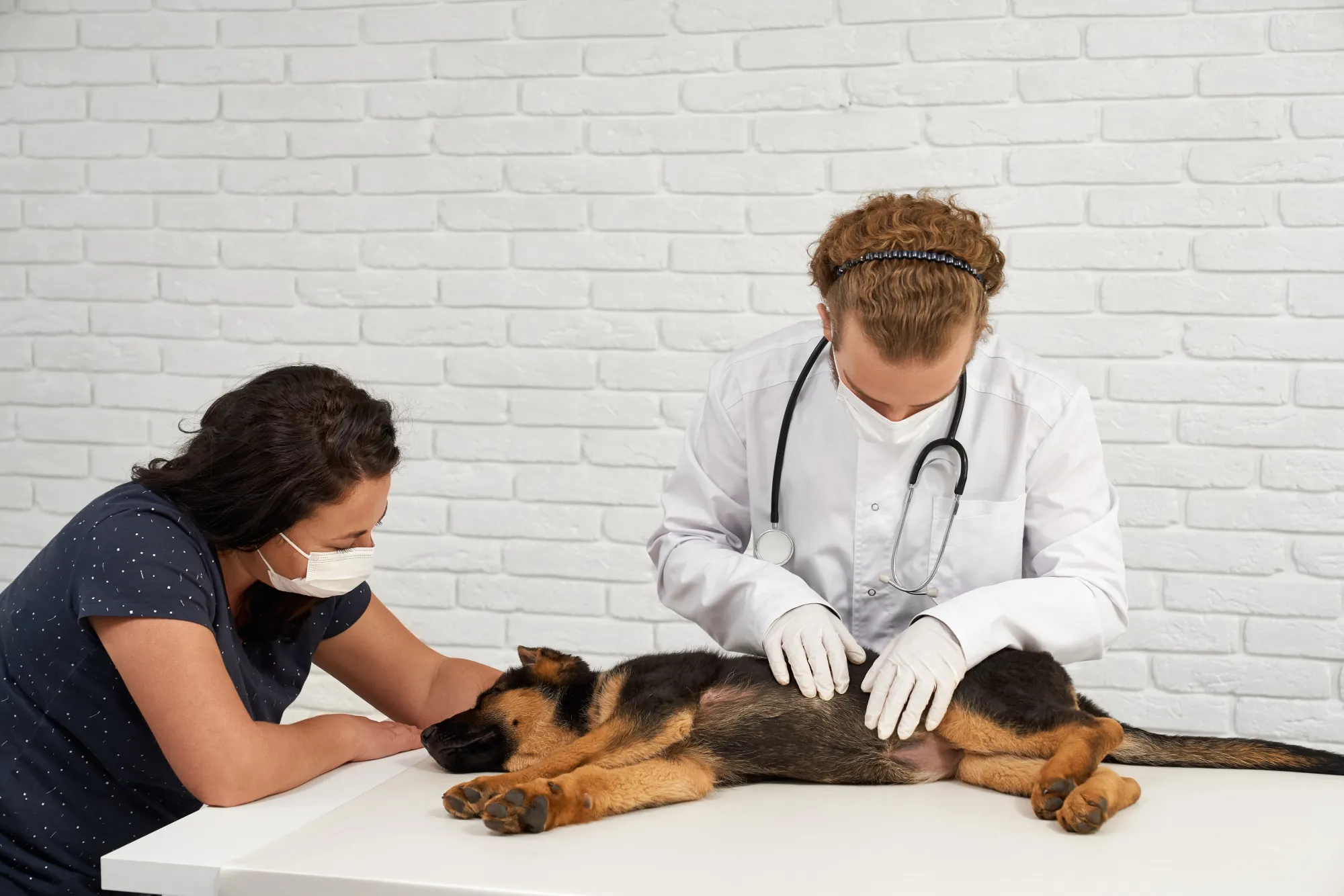Dogs have a reputation for being voracious eaters, and it's not uncommon to see them begging for food at the dinner table or scavenging for scraps on the floor. But why do dogs always seem to be hungry? The answer lies in their biology and evolutionary history.

Firstly, it's important to understand that dogs are descended from wolves, who are opportunistic hunters and scavengers. In the wild, wolves may go days or even weeks without a meal, so they have evolved to eat whenever food is available. This means that they have a strong drive to seek out and consume food, even when they're not actually hungry.
Secondly, dogs have a relatively high metabolism compared to humans, which means that they burn calories more quickly. This, combined with their active lifestyles and constant need for energy, means that they need to eat more frequently than we do. Additionally, some breeds of dogs are more prone to obesity than others, which can exacerbate their appetite and make them even more food-focused.
Overall, dogs' constant desire for food is a natural part of their biology and history as scavengers and hunters. While it can be frustrating for owners who are trying to regulate their pets' diets, it's important to remember that dogs' appetites are driven by instinct and survival needs.
Understanding Dog Appetites
Dogs are known for their love of food and their seemingly insatiable appetites. However, there are several factors that contribute to a dog's desire to eat, including biological, health, behavioral, and life stage influences.
Biological Factors
Dogs are descendants of wolves, and their instinct to hunt and scavenge for food is deeply ingrained in their genetic makeup. Domesticated dogs have retained this instinct, and their biology is designed to support a high calorie intake to fuel their energy needs.
Health and Nutrition
A hungry dog may be a sign of poor health or inadequate nutrition. Dogs require a balanced diet of essential nutrients, including protein, carbohydrates, fats, vitamins, and minerals. Feeding a dog a diet that is deficient in these nutrients can lead to overeating as the dog tries to satisfy its nutritional needs.
Behavioral Influences
A dog's environment and mental stimulation can also influence its appetite. Dogs that are bored or stressed may turn to food for comfort, leading to overeating and weight gain. Additionally, dogs that have developed a habit of being fed table scraps or treats may develop a preference for human food and become picky eaters.
Life Stages and Appetite
A dog's appetite can also be influenced by its life stage. Puppies require more food to support their growth and development, while senior dogs may have a decreased appetite due to aging and changes in their body weight. Providing an appropriate amount of food and monitoring a dog's calorie intake is important to maintain a healthy weight and prevent overeating.
In conclusion, understanding the various factors that contribute to a dog's appetite can help pet owners make informed decisions about their dog's nutrition and feeding habits. By providing a balanced diet, ensuring adequate exercise and mental stimulation, and monitoring calorie intake, pet owners can help their dogs maintain a healthy weight and overall well-being.
Common Feeding Practices

Scheduled Feeding vs. Free Feeding
One of the most common feeding practices for dogs is scheduled feeding. This involves feeding the dog at specific times of the day, usually two to three times a day. Scheduled feeding helps to regulate the dog's appetite and prevents overeating. It also helps the dog maintain a healthy weight and promotes a regular bowel movement.
On the other hand, free feeding involves leaving food out all day for the dog to eat whenever it wants. This practice is not recommended as it can lead to overeating and obesity. It also makes it difficult to monitor the dog's food intake and can result in digestive problems.
Treats and Human Food
Many dog owners like to give their pets treats and human food as a way to show affection. While this is a nice gesture, it can lead to weight gain and other health problems. Treats and human food should be given in moderation and as part of the dog's daily calorie intake.
It is important to note that some human foods are toxic to dogs and should never be given to them. These include chocolate, grapes, onions, garlic, and avocado.
Dietary Adjustments and Control
Dietary adjustments and control are important for maintaining a healthy weight and preventing obesity in dogs. If a dog is overweight, it is important to adjust its diet and reduce calorie intake. This can be done by feeding smaller meals, reducing treats, and eliminating scraps and leftovers.
Conversely, if a dog is underweight, it may need to be fed more frequently or given higher calorie food. It is important to consult with a veterinarian to determine the appropriate diet for the dog's specific needs.
Regular exercise is also essential for maintaining a healthy weight and overall health in dogs. It helps to burn calories, build muscle, and improve digestion.
Medical Factors Affecting Appetite

When it comes to dogs and their insatiable appetite, there are several medical factors that can play a role. Understanding these factors can help pet owners identify potential health issues and seek proper treatment from a veterinarian.
Diseases and Disorders
There are several diseases and disorders that can cause increased appetite in dogs. For example, diabetes can cause dogs to feel constantly hungry and thirsty, while hyperthyroidism can cause an increase in appetite and weight loss. Cushing鈥檚 disease, pancreatic disorders, and intestinal cancer can also lead to increased appetite in dogs.
Symptoms and Diagnosis
If a pet owner notices that their dog is constantly hungry or seems to be starving, it may be a sign of an underlying medical condition. Other symptoms that may accompany increased appetite in dogs include vomiting, diarrhea, and chronic diarrhea. A veterinarian can perform diagnostic tests to determine the cause of these symptoms and identify any underlying medical conditions.
Medications and Treatments
In some cases, medications may be necessary to treat the underlying medical cause of increased appetite in dogs. For example, insulin injections may be necessary to manage diabetes, while medication to regulate thyroid hormones may be necessary for dogs with hyperthyroidism. In other cases, dietary changes or supplements may be recommended to manage symptoms and improve overall health.
Overall, it is important for pet owners to be aware of the potential medical causes of increased appetite in dogs. If a pet owner notices that their dog is constantly hungry or exhibiting other symptoms, they should seek the advice of a veterinarian to identify any underlying medical issues and develop an appropriate treatment plan.
Psychological Aspects of Feeding

Stress and Anxiety
Dogs are known to experience stress and anxiety, just like humans. In some cases, these emotions can lead to changes in their eating habits. For example, if a dog is feeling anxious or stressed, they may lose their appetite or become picky eaters. On the other hand, some dogs may turn to food as a way to cope with these emotions, leading to overeating and weight gain.
Behavioral Changes
A new human member in the household can also cause behavioral changes in dogs. Dogs are pack animals and may view their human family as their pack. The introduction of a new member can cause stress and anxiety, leading to changes in their eating habits. In some cases, dogs may become protective of their food, leading to aggression or other behavioral issues.
Pack Dynamics
In the wild, dogs are part of a pack with a clear pack leader who controls access to limited resources, including food. In a domestic setting, dogs may view their human family as their pack and may exhibit pack dynamics when it comes to food. Some dogs may become possessive of their food or view mealtime as a competition with other family members.
It is important for dog owners to understand the psychological aspects of feeding and to provide a safe and stress-free environment for their pets. This includes ensuring that dogs have access to adequate nutrition without overfeeding or underfeeding, as well as addressing any behavioral issues related to food. By understanding the reasons behind a dog's excessive appetite or changes in eating habits, owners can provide the necessary support and care for their furry friends.
Evolutionary Perspective
Dogs have an insatiable appetite, and it is not uncommon for them to beg for food or scavenge for scraps. From an evolutionary perspective, this behavior can be traced back to their wild ancestors and their instinctual drive to survive.
Wild Ancestors and Instincts
Dogs evolved from wolves, who were scavengers and opportunistic hunters. In the wild, food is a scarce resource, and wolves had to compete with other predators for access to it. This led to the development of a strong instinct to seek out and consume as much food as possible when it was available. This instinct is still present in dogs today, and it drives their constant search for food.
Domestication and Dependence
When dogs were domesticated, their dependence on humans for food increased. This dependence has led to a change in their behavior, as they have learned to beg for food and scavenge for scraps. This behavior is reinforced by humans who often give in to their dogs' demands for food.
However, this dependence on humans has also led to an increase in the number of overweight dogs. Many owners overfeed their dogs, leading to obesity and health problems. It is important for owners to monitor their dogs' food intake and provide them with a healthy diet to prevent health problems.
In conclusion, dogs' constant desire for food can be traced back to their wild ancestors and their instinctual drive to survive. Domestication has led to a dependence on humans for food, which has changed their behavior and led to an increase in overweight dogs. It is important for owners to provide their dogs with a healthy diet and monitor their food intake to prevent health problems.
Practical Tips for Managing Canine Hunger

Dogs are known to have a big appetite and can become quite demanding when it comes to food. However, it is important to manage their hunger to maintain their health and prevent obesity. Here are some practical tips for managing canine hunger:
Feeding Schedules and Portion Control
Establishing a feeding schedule is crucial to prevent overeating and obesity. It is recommended to feed adult dogs twice a day, while puppies may require more frequent feedings. Portion control is also important to ensure that dogs are getting the right amount of food. Owners can use measuring cups or a kitchen scale to accurately measure their dog's food.
Choosing the Right Diet
Choosing the right diet is essential for a dog's health and nutrition. It is important to select a high-quality dog food that is rich in nutrients and protein. Owners should also avoid feeding their dogs table scraps, which can be high in calories and unhealthy for dogs. Additionally, incorporating vegetables and fruits into a dog's diet can provide additional nutrients and help manage hunger.
Exercise and Activity
Regular exercise and activity can help manage a dog's hunger and prevent obesity. Owners should provide their dogs with daily exercise, such as walks or playtime. This can help burn calories and prevent overeating. Additionally, providing dogs with interactive toys or puzzles can provide mental stimulation and prevent boredom, which can lead to overeating.
In summary, managing a dog's hunger is essential for their health and well-being. Establishing a feeding schedule, controlling portions, choosing the right diet, and providing regular exercise and activity can help prevent overeating and obesity. By following these practical tips, owners can ensure that their dogs are healthy and happy.
When to Consult a Veterinarian

If a dog's appetite seems to be out of control, it may be time to consult a veterinarian. While dogs are known for their love of food, excessive hunger can be a sign of underlying medical issues. In this section, we will discuss how to recognize abnormal appetite, potential medical interventions, and how to monitor a dog's health and behavior.
Recognizing Abnormal Appetite
Increased appetite in dogs can be caused by a variety of medical conditions, including diabetes, hyperthyroidism, and Cushing's disease. If a dog's hunger seems insatiable, it may be a sign of an underlying medical issue. Other symptoms to watch out for include weight gain, increased thirst, and changes in behavior.
Potential Medical Interventions
If a dog's increased appetite is caused by a medical condition, treatment will depend on the underlying issue. In some cases, medications may be prescribed to manage symptoms and improve overall health. In other cases, surgery may be necessary to correct the problem.
Monitoring Health and Behavior
If a dog's appetite seems abnormal, it is important to monitor their health and behavior closely. Keep track of any changes in appetite, thirst, or behavior, and report them to a veterinarian as soon as possible. Regular check-ups with a veterinarian can also help to identify any underlying medical issues before they become more serious.
In conclusion, if a dog's appetite seems out of control, it is important to consult a veterinarian to rule out any underlying medical issues. By recognizing abnormal appetite, understanding potential medical interventions, and monitoring health and behavior, dog owners can help ensure their pets stay healthy and happy.
Conclusion
In conclusion, dogs' seemingly insatiable appetites can be attributed to a complex interplay of biological, evolutionary, health, behavioral, and environmental factors. Understanding these underlying reasons is crucial for pet owners to manage their furry companions' dietary needs effectively. By establishing regular feeding schedules, choosing appropriate diets, providing adequate exercise, and being mindful of medical and psychological influences on appetite, owners can help ensure their dogs maintain a healthy weight and overall well-being.
It's also important to recognize when a dog's appetite may indicate underlying health issues, necessitating a consultation with a veterinarian. Ultimately, a balanced approach to feeding and caring for dogs, informed by an understanding of their natural instincts and needs, can contribute to their happiness and longevity.
FAQs
- Why do dogs always seem to be hungry?
- Dogs' constant hunger can be traced back to their evolutionary history as descendants of wolves, who are opportunistic feeders. Their biology is geared towards consuming food whenever it is available, driven by the need to survive periods of scarcity in the wild.
- Can a dog's diet affect its appetite?
- Yes, a dog's diet plays a significant role in its appetite. A balanced diet that meets all nutritional needs can regulate a dog's hunger, while a diet lacking in essential nutrients may lead to overeating as the dog tries to fulfill its nutritional requirements.
- How can I prevent my dog from overeating?
- Establishing a scheduled feeding routine, portion control, and avoiding free feeding can help prevent overeating. Choosing the right diet and incorporating regular exercise into your dog's routine are also key strategies.
- Are some dogs more prone to obesity than others?
- Yes, certain dog breeds and individuals may have a predisposition to obesity due to genetic factors, slower metabolism, or less active lifestyles. It's important to tailor diet and exercise plans to the specific needs of each dog.
- How does a dog's life stage affect its appetite?
- A dog's appetite can vary with its life stage; puppies often require more food for growth and development, while senior dogs may experience a decrease in appetite due to aging and changes in metabolism.
- What should I do if my dog is always hungry?
- If your dog's hunger seems excessive, first evaluate and adjust their diet and exercise routine. If the issue persists, consult a veterinarian to rule out underlying health conditions that might be causing increased appetite.
- Can human food be harmful to dogs?
- Yes, some human foods are toxic to dogs, such as chocolate, grapes, onions, garlic, and avocado. Feeding dogs human food should be done with caution and in moderation, considering their specific dietary needs.
- What role do medical conditions play in a dog's appetite?
- Certain medical conditions like diabetes, hyperthyroidism, and Cushing's disease can lead to increased appetite in dogs. It's crucial to monitor any sudden changes in appetite and consult a veterinarian for a proper diagnosis and treatment plan.
- How can psychological factors influence a dog's eating habits?
- Stress, anxiety, and changes in the household or routine can impact a dog's eating behavior, leading to loss of appetite or overeating as a coping mechanism.
- What are some practical tips for managing my dog's hunger?
- Implementing a regular feeding schedule, ensuring a nutritionally balanced diet, engaging your dog in regular exercise, and using interactive toys for mental stimulation can help manage your dog's hunger effectively.




